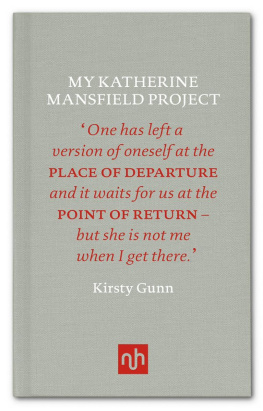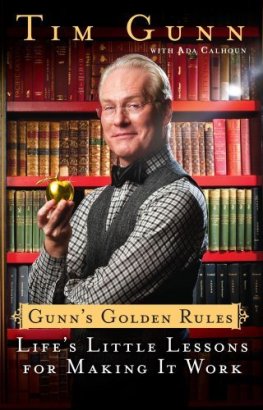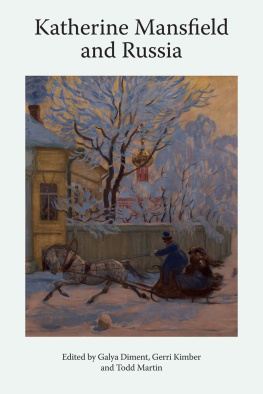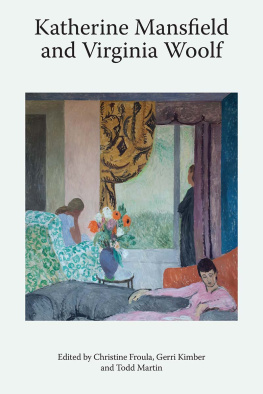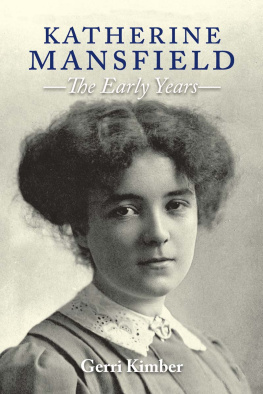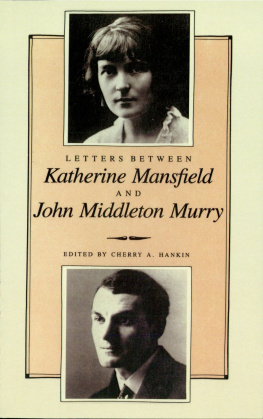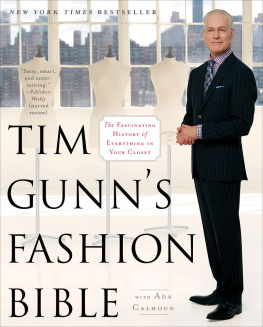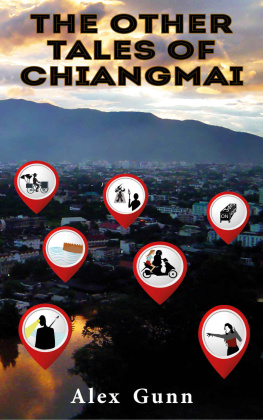Gunn Kirsty - My Katherine Mansfield Project
Here you can read online Gunn Kirsty - My Katherine Mansfield Project full text of the book (entire story) in english for free. Download pdf and epub, get meaning, cover and reviews about this ebook. City: London;New Zealand, year: 2016;2015, publisher: Notting Hill Editions, genre: Art. Description of the work, (preface) as well as reviews are available. Best literature library LitArk.com created for fans of good reading and offers a wide selection of genres:
Romance novel
Science fiction
Adventure
Detective
Science
History
Home and family
Prose
Art
Politics
Computer
Non-fiction
Religion
Business
Children
Humor
Choose a favorite category and find really read worthwhile books. Enjoy immersion in the world of imagination, feel the emotions of the characters or learn something new for yourself, make an fascinating discovery.
- Book:My Katherine Mansfield Project
- Author:
- Publisher:Notting Hill Editions
- Genre:
- Year:2016;2015
- City:London;New Zealand
- Rating:3 / 5
- Favourites:Add to favourites
- Your mark:
- 60
- 1
- 2
- 3
- 4
- 5
My Katherine Mansfield Project: summary, description and annotation
We offer to read an annotation, description, summary or preface (depends on what the author of the book "My Katherine Mansfield Project" wrote himself). If you haven't found the necessary information about the book — write in the comments, we will try to find it.
My Katherine Mansfield Project — read online for free the complete book (whole text) full work
Below is the text of the book, divided by pages. System saving the place of the last page read, allows you to conveniently read the book "My Katherine Mansfield Project" online for free, without having to search again every time where you left off. Put a bookmark, and you can go to the page where you finished reading at any time.
Font size:
Interval:
Bookmark:

I began reading it and could not put it down until I had finished. I think it is beautiful It amalgamates memory and fiction and research and journal so sensitively and in such an original way that I came away feeling [Kirsty Gunn] had escaped all the old hackneyed ways of writing about influence and created something wholly her own It really lives. All of it. John Carey, critic, author and twice chair of the Booker Prize
A beautiful and mood-provoking book the writing went into my consciousness and I felt the loneliness, the sadness, the love and identification with Katherine Mansfield It was beautiful. Jane Campion, screenwriter and director
Kirsty Gunn has written five works of fiction and three short story collections. Her books have been broadcast and turned into film and dance theatre. Her most recent novel, The Big Music, won The New Zealand Post Book of the Year 2013. The Boy and the Sea was the 2007 Sundial Scottish Book of the Year and her previous work Featherstone was a New York Times Notable Book and received a Scottish Arts Council Bursary for Literature. Her new collection of short stories, Infidelities, was published in 2014 and won the Edge Hill Short Story Prize. She is Professor of Writing Practice and Study at the University of Dundee, and lives in London and Scotland with her husband and two daughters.
- My Katherine Mansfield Project
First Thoughts, Context and Ideas about Home - The Voyage
Setting Out, Rough Seas and a Story, Essay and
a Letter from Thorndon - The Dolls House
Settling In, Arranging Papers, Writing and Reading
and Creating Fiction
Light and Dark, Winter and Summer and
Living in Two Places at Once
A number of years ago I wrote a collection of short stories called This Place You Return to is Home. The title story, connected to the others by themes of homecoming and identity, explored the idea that, as the poet Robert Frost had it, Home is the place where, when you have to go there, they have to take you in, could be created in a narrative. Do you remember? How we were safe there? I wrote, about the grandmothers house in that title story. Can I make for you in words that safe place where we can stay?
Its an idea that has always preoccupied me that notion of creative process as a making, a willed brick-by-brick, word-by-word building of a place on the page that might let a story inhabit it to create a home of words where I, the writer, may also live. And the idea of return, too, as is there in the title of that story that writing itself may enact a kind of going back, to the next story one is writing and then to the next and the next back to the desk, again and again, to the page, to the paragraphs, those bricks and mortar of the writers life returning, as well, to some central idea that powers and draws all my work to it in the first place, thats ineffable and, in the end, mysterious to me, waiting at the end of the road, to take me in.
So then, making a home in words feels to me as real, as practical and quotidian, as making a home in a house, as I have made my home in a street in West London, and in the hills of Sutherland in the far northeast of Scotland where I also live. Ive been at home in these places for most of my adult life though I grew up far away on the other side of the world, in Wellington, New Zealand, that was also home. I hated it, said Katherine Mansfield, and she left returning only in the stories and short fiction we count amongst her very best, thinking, imagining, remembering a far-off place for the rest of her short life, bringing its streets and sounds and textures and light and weather back into the words she built around her.
That wild ambivalence of hers carrying both the desperate need to escape and what the Germans call so perfectly heimweh, the near untranslatable word that seems to me to bear with it, along with the pained sense of separation from home, a sort of sound, plangent and sustained, like a long note, and, as well, a kind of motion homewards, a way, as one journeys in ones mind back to the place left behind I understand. I read it there, the homewardness that runs through Mansfields stories and journals and letters thats both sick of home and homesick for it, as though I were reading an account of my own life.
That is why I had to make this story of mine, this book. I needed to try and understand that splitting of self that would take a writer away and would bring her back again, to explore in words what it might be to call this place home, and also that, to carry two powerful ideas of where we might belong in our heads and hearts and on the page at the same time.
Mansfields stories about New Zealand dont just describe the home that was left, sealed off in the memory chamber of the past, but re-enact the experience of being back there again:
Slowly she walked up the back steps, and through the scullery into the kitchen. Nothing was left in it but a lump of gritty yellow soap in one corner of the kitchen window sill and a piece of flannel stained with a blue bag in another. The fireplace was choked up with rubbish. She poked among it but found nothing except a hair-tidy with a heart painted on it that had belonged to the servant girl. Even that she left lying, and she trailed through the narrow passage into the drawing room. The venetian blind was pulled down but not drawn close. Long pencil rays of sunlight shone through and the wavy shadow of a bush outside danced on the gold lines.
Prelude
Frank OConnor misses the point, I think, when he takes up a remark made by V. S. Pritchett about her stories not feeling real because the setting of them was so unknown to the reader, so exotic, so far away. to introduce a real country into At the Bay would be to introduce history, and with history would come judgement, will, and criticism. The real world of these stories is not New Zealand but childhood, he writes, and they are written in a complete hypnotic suspension of the critical faculties These stories are conscious, deliberate acts of magic. Yet, isnt precisely Mansfields achievement that of conjuring up the same magic? That the reader really does feel herself to be transported, released from reading about a there to becoming immersed in the here? Living amongst the pages of the stories, roaming around the rooms and streets of the authors past as though it were our own?
The house was alive with soft, quick steps and running voices. The green baize door that led to the kitchen regions swung open and shut with a muffled thud.
The Garden Party
That muffled thud, those soft, quick steps. All it takes is a few words and we are right inside.
And to be inside the protection of a construction of words is to feel safe. I am as at home in the house and garden of Mansfields story as any of the characters with whom I share the fictional space, transported by a complete, hypnotic suspension thats been conjured up by the authors sense of her past and recreated in what she called special prose. Of Prelude, that long short story that is more of a short, short novel and the whole thing fashioned out of her childhood home, she wrote, after it had been sent off to the Woolfs Hogarth Press:
My poor dear Prelude is still piping away in their little cage and not out yet. I read some pages of it and scarcely knew it again. It all seems so once upon a time And wont the Intellectuals just hate it. Theyll think its a new primer for Infant readers. Let em.
She knew how close to her were the words she had written, how hair-fine the boundary between life and art. Being homeless is to be alert to that kind of thing, the psychic need to create something that may stand in for what has been lost. In that state the work itself has never felt so certain.
Font size:
Interval:
Bookmark:
Similar books «My Katherine Mansfield Project»
Look at similar books to My Katherine Mansfield Project. We have selected literature similar in name and meaning in the hope of providing readers with more options to find new, interesting, not yet read works.
Discussion, reviews of the book My Katherine Mansfield Project and just readers' own opinions. Leave your comments, write what you think about the work, its meaning or the main characters. Specify what exactly you liked and what you didn't like, and why you think so.

